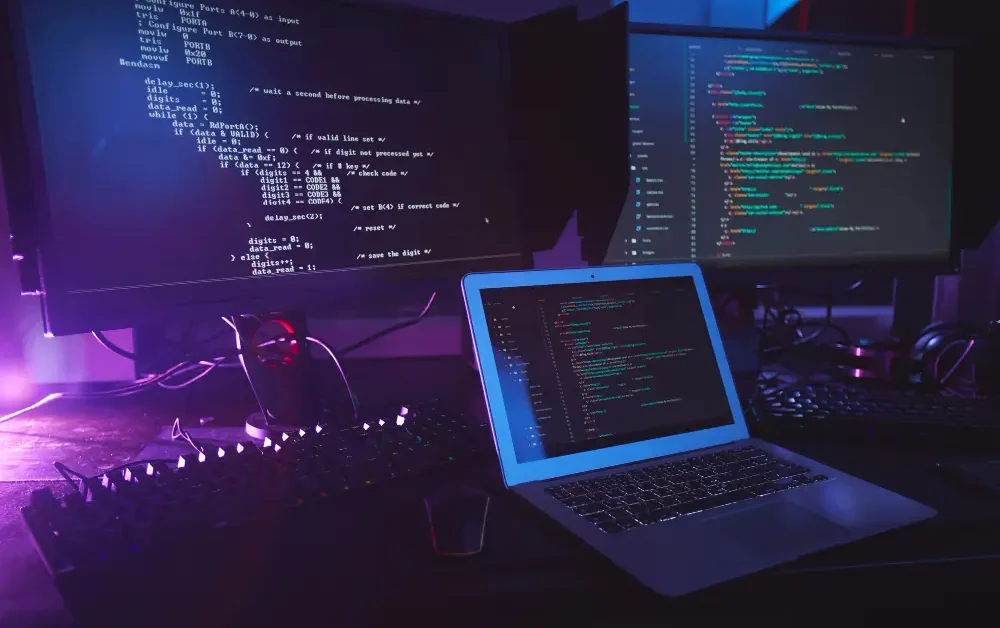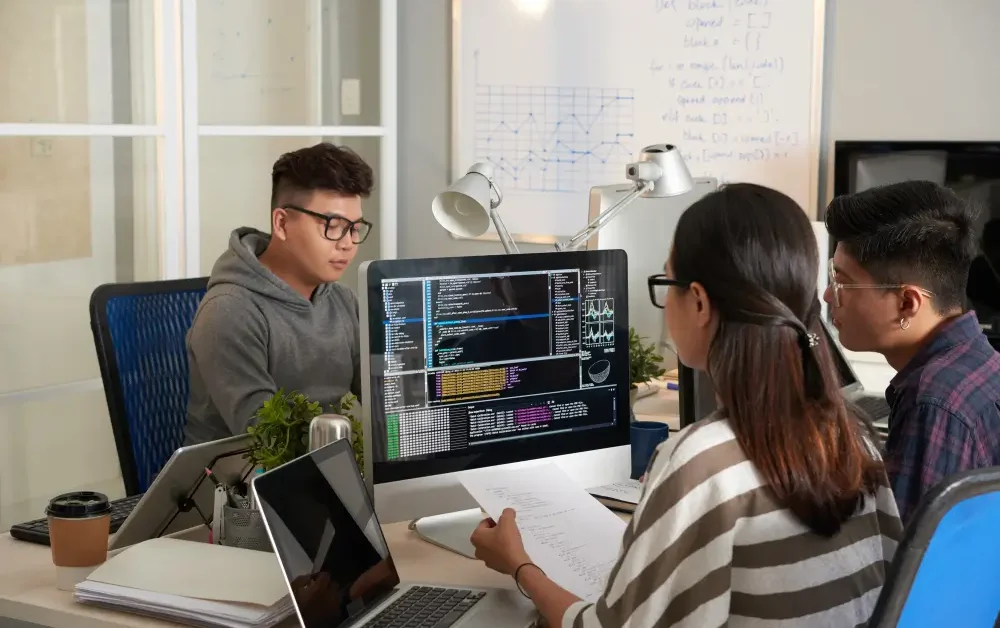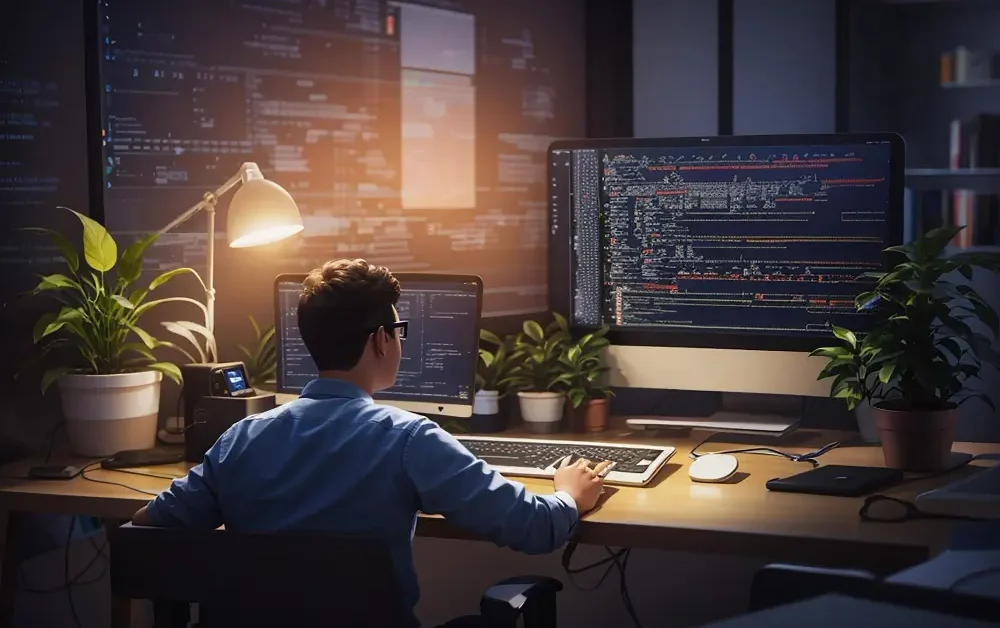Welcome to the fascinating intersection of artificial intelligence and programming, where speculation and curiosity thrive! At the core of this discussion lies a compelling question: “Will AI replace programmers?” In this article, we embark on a journey to explore the future of coding, illuminating the intricate relationship between artificial intelligence and human programmers. Together, let’s delve into the advancements, challenges, and implications, unraveling the mysteries behind the potential integration of AI into coding workflows. Join us on this intellectual exploration as we peer into the future, envisioning a world where AI and programmers coexist or chart distinct paths.
Table of Contents
Assessing the Current State: Will AI Replace Programmers in Programming’s Evolution?
In the rapidly advancing programming landscape, AI’s current state is a testament to the transformative potential that artificial intelligence holds. The overarching question that resonates through the tech community is, “Will AI replace programmers?” The field has experienced remarkable progress, with machine learning algorithms and sophisticated AI models demonstrating proficiency in automating certain aspects of coding.
AI is reshaping how programmers work, from automating repetitive tasks to assisting in debugging and code optimization. However, the prevailing sentiment is one of collaboration rather than replacement. AI is increasingly seen as a valuable ally, enhancing the capabilities of programmers and augmenting their skill sets.

The applications of AI in programming are diverse and expanding, reflecting the dynamic relationship between technology and human ingenuity. Natural language processing capabilities allow for more intuitive interactions with code, and machine learning algorithms can analyze vast datasets to identify potential issues or recommend improvements.
While the integration of AI raises questions about the future role of human programmers, the current state suggests a coexistence where AI serves as a powerful tool, amplifying the creative and problem-solving capacities of human coders. As we navigate this technological frontier, it becomes evident that whether AI will replace programmers is not just a speculative inquiry but a nuanced exploration of the evolving dynamics within the coding ecosystem.
Advancements in Artificial Intelligence
The relentless pace of advancements in artificial intelligence (AI) has ushered in a new era of possibilities, leaving an indelible mark on the programming landscape. With sophisticated machine learning algorithms and breakthroughs in deep learning, AI has transcended its former constraints. The question reverberating through the tech community is, “Will AI replace programmers?” These advancements have enabled AI systems to tackle complex coding tasks, from generating code snippets to optimizing algorithms.
The evolution of AI in programming is not merely about automating routine tasks but signifies a paradigm shift in the very nature of coding. As we stand on the cusp of these technological breakthroughs, the debate on whether AI will replace programmers intensifies, prompting a closer examination of the transformative impact on the coding ecosystem.
Applications of AI in Coding
The applications of AI in coding are reshaping the traditional boundaries of software development, paving the way for a more collaborative and efficient coding environment. Have you ever wondered if AI will replace programmers? It’s a complex question that stems from how AI is used in different industries. AI is not just automating mundane coding tasks; it is revolutionizing how programmers approach their work.
Machine learning algorithms are increasingly becoming indispensable tools, from identifying bugs to suggesting code improvements. Integrating AI in coding workflows presents a more nuanced narrative—a collaborative synergy where AI enhances human capabilities rather than rendering programmers obsolete. The applications of AI in coding underscore the coexistence of these entities, positioning AI as a valuable ally that augments the skills and creativity of human programmers.
Impact on Programmer Roles
The impact of AI on programmer roles is a transformative journey marked by a shift from routine coding tasks to a more strategic and creative focus. The central question, “Will AI replace programmers?” encapsulates the ongoing evolution in the programmer’s role. As AI automates routine and repetitive coding tasks, programmers find themselves liberated to engage in higher-level problem-solving and decision-making.

The impact on programmer roles is not synonymous with replacement but rather a redefinition—a symbiotic relationship between AI and human programmers. Human programmers’ innate creativity, critical thinking, and ethical considerations remain paramount. While AI contributes to efficiency and optimization, the irreplaceable human touch in coding persists, emphasizing the coexistence and collaborative potential between AI and programmers in shaping the future of coding.
Navigating the Landscape of Future Coding
Navigating the landscape of future coding is an intricate journey that demands a thoughtful examination of the evolving relationship between artificial intelligence (AI) and human programmers. As we peer into the horizon of technological progress, the resounding question emerges: “Will AI replace programmers?” This inquiry is a compass for exploring the multifaceted possibilities, challenges, and transformations awaiting the coding realm.
The future of coding entails navigating through the uncharted territory of AI integration, forecasting potential scenarios where intelligent systems collaborate or replace traditional programming roles. Striking a balance between technological innovation and human ingenuity becomes imperative as we unravel the intricate web of possibilities, understanding that the landscape of future coding is shaped by both the capabilities of AI and the nuanced expertise of human programmers.
Anticipating Futures: Will AI Replace Programmers in Forecasting Scenarios?
Forecasting potential scenarios in the realm of future coding involves envisioning how the integration of artificial intelligence (AI) might shape the programming landscape. The central query, “Will AI replace programmers?” is a guidepost in exploring diverse outcomes. One scenario posits a future where AI becomes an indispensable collaborator, automating routine tasks and allowing programmers to focus on more creative and strategic aspects of coding.
Alternatively, there are concerns about a scenario where AI replaces specific programming roles, leading to questions about the adaptability of the workforce and the potential societal impacts. Navigating these possible scenarios requires a careful examination of technological trajectories and a nuanced understanding of how AI can coexist or redefine the role of human programmers in the coding community.
Navigating Challenges and Opportunities: Will AI Replace Programmers in the Coding Landscape?
Integrating AI in coding presents a spectrum of challenges and opportunities for the programming community. The ongoing debate on “Will AI replace programmers?” reflects the dual nature of this evolution. Challenges emerge from concerns about job displacement, ethical considerations, and the need for re-skilling to adapt to an AI-driven coding environment.

However, amidst these challenges lie numerous opportunities for innovation, efficiency, and collaboration. AI offers the potential to streamline development processes, improve code quality, and unlock new dimensions of creativity. Navigating this landscape requires a proactive approach to address challenges while seizing the opportunities that arise, ensuring a harmonious integration of AI into the coding ecosystem.
Implications for the Coding Community
The implications of AI for the coding community are profound and multifaceted, encapsulating both the promises and uncertainties of technological advancement. The question of “Will AI replace programmers?” permeates discussions about the professional landscape of coders. The coding community faces the challenge of adapting to new paradigms where AI augments traditional roles.
This evolution brings about ethical considerations, such as the responsible use of AI in programming and ensuring fairness in algorithms. Additionally, there are implications for education and skill development within the coding community, as programmers must equip themselves with the necessary expertise to collaborate effectively with AI systems. Navigating these implications involves:
- Fostering a dynamic dialogue within the coding community.
- Facilitating continuous learning.
- Collectively shaping the future of coding in an AI-driven era.
Coexistence or Divergence: AI and Human Programmers:
The intersection of artificial intelligence (AI) and human programmers prompts a crucial exploration into whether they will coexist harmoniously or witness a more pronounced divergence. The persistent question, “Will AI replace programmers?” is a pivot in this discussion. The coexistence scenario envisions a symbiotic relationship where AI serves as a collaborative tool, automating routine coding tasks and augmenting the capabilities of human programmers.
In this context, human programmers would leverage AI to enhance creativity, problem-solving, and overall efficiency in software development. Conversely, the divergence scenario raises the prospect of AI gradually taking over specific programming roles, potentially transforming the professional landscape. Navigating this dichotomy involves assessing the evolving dynamics between AI and human programmers, deciphering whether they will merge as partners in innovation or follow divergent paths in the ever-evolving coding ecosystem.
Examining Collaborative Possibilities that AI will replace programmers
Examining collaborative possibilities between artificial intelligence (AI) and human programmers unveils innovation where both entities synergize their strengths. The ongoing debate, “Will AI replace programmers?” pivots on the potential collaborative landscape. One possibility lies in AI serving as a valuable collaborator, automating routine coding tasks, and providing data-driven insights.
This collective potential extends to code generation, bug detection, and algorithm optimization. By harnessing AI for efficiency and productivity, human programmers can elevate their focus to more creative and intricate aspects of coding. Navigating these collaborative possibilities involves fostering a working environment that encourages seamless integration and mutual empowerment, envisioning a future where AI enhances the capabilities of human programmers rather than supplanting them.
Examining Potential Conflicts: Will AI Replace Programmers in Analysis?
Analyzing potential points of conflict in the collaboration between AI and human programmers sheds light on the nuanced challenges accompanying technological integration. The pivotal question, “Will AI replace programmers?” underscores concerns that may lead to points of contention. Job displacement fears arise as routine coding tasks become automated, raising questions about the future employ ability of human programmers.
Ethical considerations also surface, as the responsibility for algorithmic decisions, may become intertwined with questions of accountability. As we navigate the integration of AI, addressing these potential points of conflict involves proactive measures, including up skilling initiatives, ethical guidelines, and a robust framework for managing the evolving roles within the coding community.
The Role of Human Creativity in Coding
The role of human creativity in coding becomes a focal point in the discussion of AI collaboration. The question “Will AI replace programmers?” is intrinsically tied to the unique creative capacities of human coders. While AI excels at repetitive tasks and data-driven decision-making, the inherently creative and intuitive nature of coding remains a distinctly human attribute. Human programmers bring innovation, adaptability, and ethical considerations to the coding process, contributing to developing groundbreaking solutions.
In navigating the evolving landscape, recognizing and nurturing the role of human creativity becomes paramount. The collaborative future involves leveraging AI as a tool that amplifies and complements the inventive capacities of human programmers, ensuring that the synergy between technological advancements and human ingenuity propels the coding community into new frontiers.
Industry Insights and Expert Perspectives
Industry insights and expert perspectives on the ongoing integration of artificial intelligence (AI) into the coding landscape shed light on the nuanced considerations surrounding the question, “Will AI replace programmers?” Leaders in the tech industry provide invaluable perspectives that shape the discourse on the future of coding. Insights from industry experts often emphasize the transformative potential of AI, depicting it as a tool that can enhance efficiency, optimize processes, and unlock innovative possibilities.
While recognizing the significant contributions of AI, these experts also underscore the need for a nuanced understanding of its limitations and ethical implications. Navigating the evolving dynamics between AI and human programmers involves heeding the insights from industry leaders, fostering a collaborative environment, and adapting to the ever-changing technological landscape.
Tech Leaders’ Views: Will AI Replace Programmers?
Gaining perspectives from leading tech professionals is pivotal in deciphering the intricate nuances surrounding the question, “Will AI replace programmers?” Often at the forefront of technological innovation, these experts offer valuable insights into the symbiotic relationship between AI and human programmers.
While some anticipate a future where AI augments human capabilities, others underscore the importance of ethical considerations and the potential challenges in navigating this integration. By tapping into the collective wisdom of these industry leaders, a more comprehensive understanding emerges, guiding the coding community in shaping a future where AI and human programmers collaborate synergistically.
Industry Trends Shaping the Future of Coding
Exploring industry trends shaping the future of coding provides a holistic view of the dynamic landscape influenced by AI. Whether AI will replace programmers is intricately linked to these trends. One notable trend is the increased emphasis on AI-driven automation, streamlining coding workflows, and optimizing software development processes.
Another trend revolves around the growing demand for interdisciplinary skills, recognizing that future programmers may need to seamlessly collaborate with AI systems. Additionally, the rise of responsible AI practices and ethical considerations in coding aligns with the evolving nature of the industry. Navigating the future of coding involves:
- Staying attuned to these trends.
- Understanding their implications.
- Adapting to the changing demands of the tech landscape.
Examining Cases: Will AI Replace Programmers in Programming Integration?
Examining case studies of AI integration in programming provides tangible insights into real-world scenarios, shedding light on whether AI will replace programmers or redefine their roles. These studies showcase instances where AI contributes to efficiency, identifies patterns, and enhances code quality. Importantly, they highlight the collaborative nature of AI and human programmers, emphasizing models where AI serves as a valuable tool rather than a replacement.
By delving into these case studies, the coding community can glean valuable lessons on the successful integration of AI, identifying best practices, potential challenges, and the role of human creativity in addressing complex coding problems. Navigating the integration of AI in programming becomes more informed and nuanced through the lens of these real-world examples, offering practical insights for the future.
Ethical Considerations in AI-Driven Coding
Ethical considerations in AI-driven coding form a critical dimension of the ongoing discourse surrounding the potential impact on the roles of programmers. As the technological landscape evolves, the question of “Will AI replace programmers?” intersects with ethical dilemmas arising from integrating artificial intelligence into coding workflows. One of the foremost concerns centers around accountability and transparency, mainly as AI systems make autonomous decisions in code generation and optimization.
Programmers grapple with ensuring that AI-driven algorithms are fair, unbiased, and aligned with ethical standards, raising questions about how to safeguard against unintended consequences or discriminatory outcomes. Navigating this moral terrain necessitates a proactive approach to developing frameworks that prioritize transparency, accountability, and the ethical use of AI in coding, ensuring that the collaborative relationship between AI and human programmers upholds ethical standards.
Ensuring Fairness: Will AI Replace Programmers? Addressing Bias Mitigation
In AI-driven coding, ensuring fairness and mitigating bias are paramount ethical considerations that directly address concerns about the potential replacement of programmers. “Will AI replace programmers?” is intricately linked to the need for unbiased AI systems that do not perpetuate or exacerbate existing biases. When trained on biased data, AI algorithms can inadvertently introduce discriminatory patterns into code generation or decision-making processes.
Therefore, ensuring fairness requires rigorous efforts to identify and rectify biases in training data, algorithms, and outputs. The coding community faces the ethical responsibility of implementing continuous monitoring, evaluation, and adjustment mechanisms to promote fairness and mitigate bias in AI-driven coding systems, ensuring that the technology complements rather than supplants human programmers.
AI Developers’ Ethics: Will AI Replace Programmers?
The ethical responsibilities of AI developers play a pivotal role in shaping the narrative surrounding the potential replacement of programmers by AI. Developers stand at the forefront of creating and fine-tuning AI systems, and their ethical considerations directly impact the collaborative integration of AI and human programmers. Beyond technical proficiency, AI developers are responsible for prioritizing ethical considerations in designing, developing, and deploying AI-driven coding tools.
This includes transparent communication about the limitations of AI systems, avoiding over reliance on automation in critical decision-making processes, and actively addressing ethical challenges such as privacy concerns. Navigating the ethical landscape involves fostering a culture of responsibility within the AI development community, ensuring that ethical considerations are an integral part of the technology’s evolution and that AI developers remain mindful of the broader societal implications of their work.
Balancing Automation with Human Oversight
The ethical balance between automation and human oversight is a critical aspect of the ongoing discourse surrounding the potential replacement of programmers by AI. The question “Will AI replace programmers?” prompts reflections on how automation can be responsibly integrated into coding workflows while retaining human oversight. Striking this balance involves acknowledging AI’s strengths and limitations, ensuring that human programmers can intervene, review, and guide AI-generated code.
Ethical considerations demand that decisions with significant societal impact or ethical implications remain subject to human judgment. This includes addressing concerns about job displacement by emphasizing the collaborative nature of AI and human programmers, where automation enhances efficiency and productivity. In contrast, human oversight ensures the ethical, creative, and context-aware aspects of coding are preserved. Navigating this delicate equilibrium requires a thoughtful approach that values the unique contributions of automation and human expertise in the coding ecosystem.
The Road Ahead: Preparing for a Transformed Coding Landscape
The road ahead in preparing for a transformed coding landscape encompasses a multifaceted approach to address the challenges and opportunities of integrating artificial intelligence (AI). The persistent question, “Will AI replace programming?” necessitates a strategic vision for the future of coding that acknowledges the evolving dynamics between AI and human programmers. As we navigate this transformative journey, prioritizing educational initiatives becomes paramount.
Programs designed to equip current and future programmers with the skills to collaborate effectively with AI systems are crucial. Emphasizing interdisciplinary learning that combines coding expertise with a deep understanding of AI technologies ensures that the coding community is well-prepared for the collaborative future where AI serves as a valuable ally rather than a replacement.
Skill sets for Future Programmers
As we contemplate the question, “Will AI replace programmers?” the skillsets deemed essential for future programmers take center stage. Beyond traditional coding expertise, future programmers must cultivate a diverse set of skills to thrive in an AI-influenced landscape. Critical thinking, problem-solving, and creativity become paramount as AI takes on routine coding tasks.
Adaptability to evolving technologies is crucial, necessitating an understanding of machine learning, data science, and natural language processing. Interpersonal skills such as effective communication and collaboration also rise significantly as future programmers will likely work alongside AI systems. Emphasizing a holistic skillset equips programmers to coexist with AI and actively contribute to the collaborative future of coding.
Education and Training Initiatives
Education and training initiatives play a pivotal role in preparing the coding community for the transformative impact of AI, addressing the question of “Will AI replace programmers?” Proactive educational programs should be designed to instill a comprehensive understanding of AI concepts, algorithms, and applications. Curricula must emphasize the ethical considerations surrounding AI and provide hands-on experience working collaboratively with AI systems.

Continuous learning platforms, workshops, and mentorship programs foster an environment where programmers can adapt to emerging technologies and stay ahead of industry trends. By investing in robust education and training initiatives, stakeholders can ensure that the coding workforce is well-versed in AI’s technical aspects and equipped with the interdisciplinary skills needed to navigate the evolving coding landscape.
Adapting to a Dynamic Technological Environment
Adapting to a dynamic technological environment is imperative for the coding community, especially in light of the ongoing integration of AI. “Will AI replace programmers?” underscores the need for an agile and adaptive workforce. Programmers must be adept at embracing new tools, languages, and frameworks, anticipating that AI will continually reshape coding practices.
Lifelong learning becomes a cornerstone, necessitating a commitment to staying informed about the latest developments in AI and related technologies. Collaboration between industry and educational institutions fosters an ecosystem where programmers are prepared to adapt and actively contribute to the evolution of coding in response to dynamic technological shifts. In this ever-changing environment, a proactive approach to learning, coupled with a mindset of continual adaptation, ensures that programmers are well-positioned to thrive in a coding landscape influenced by the integration of AI.
Here Are some Resources and References
Search for articles in academic journals related to artificial intelligence, coding, and the future of programming. Journals such as the Journal of Artificial Intelligence Research, IEEE Transactions on Neural Networks and Learning Systems, and Nature Machine Intelligence are good places to start.
Websites like arXiv.org, Google Scholar, and ResearchGate are valuable resources for academic papers, preprints, and research articles.
Conclusion
In conclusion, exploring the intriguing question “Will AI Replace Programmers?” has led us to comprehensively examine the current state and future trajectories of AI in coding. Key findings summarize the nuanced relationship between AI and human programmers, emphasizing the collaborative potential that defines the coding landscape. This analysis has illuminated the advancements in artificial intelligence, applications in coding, and the evolving roles of programmers. As we navigate the dynamic terrain of future coding, recognizing the coexistence of AI and human creativity emerges as a central theme, shaping the trajectory of the coding profession in the AI era.



